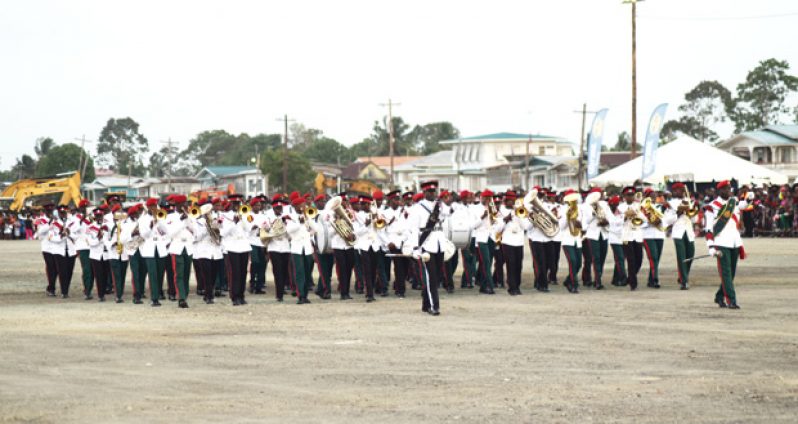–at Tuesday’s epic flag-raising ceremony
MANY Guyanese who attended Tuesday’s flag-raising ceremony at Durban Park felt as though they had been part of something great.

From the responses, many did not miss the fact that the usual ‘Mash’ Costume and Float Parade had not been held, as they had the opportunity of witnessing the “feel-good” sensation that went with the raising of the 65’ x 35’ flag to the chant of “Go Guyana, Go!”
ABIGAIL JAMES, who was a finalist at this year’s Calypso Monarch competition, said that the ceremony reminded her of her own song, “Guyana smiling again”, as the event symbolised that the country was moving forward in unity for a brighter future. “There aren’t enough words to explain how my heart felt, and how I burst into tears,” James said.
“My skin grew, and my pores rose up just seeing the massive amount of Guyanese who flowed into that park,” she added.
For GREGORY HALLEY, he felt an extra sense of pride, being not only in attendance at the event, but being part of the parade of officers on the field. He said that all the officers worked extremely hard prior to the event, practising for the ‘big day’, and they were all proud to feel the energy from the people in attendance, and he felt that way as well.

“As we marched on and the people began to scream, it motivated me and the other soldiers to give the nation a show they won’t forget,” Halley said, adding:
“Seeing the unity, cooperation and patriotism of my fellow Guyanese as the flag was being hoisted, reminded me of our motto: ‘One People, One Nation, One Destiny’.
“It made me really proud to be a part of this great nation.”
DEMALI BUTTS, who was also in the parade, also expressed his pride. “This is the first time I have ever seen an event like this. The crowd turned out to be excellent; everything went smoothy on that day, and as a Guyanese, I felt very proud,” he said.
VAULDA HARRIS, a 63-year-old mother of seven said she was undecided about going out to the ceremony, as she had gone for several years, and figured she wouldn’t miss anything.
“It’s a good thing I decided to pick up my old knees and go,” she said. “Seeing that flag, the size of it alone, I can’t remember the last time I felt like that. It’s a really good thing I go.”
MINTON BAKER said that he thought he had seen it all in his 69 years, but knew that after seeing that huge flag, and feeling the energy in the crowd, he could definitely say that he has had a full life.
“Well I see everything now,” Mr Baker said. “This is good; this is very good for Guyana. I come up in times of a lot of hardship, and I feel good now, seeing this; this is great.” Many others in the crowd could be heard trying to guess what next is in store for Guyana as the 50th Anniversary of Independence draws nearer and nearer. What many are sure of, however, is that after Tuesday’s occurrence, they will definitely be coming out in their numbers once again.
NO ORDINARY DAY
President David Granger in his Republic Day Message recalled that when independent Guyana declared itself a republic on this day 46 years ago and assumed the name, ‘The Cooperative Republic of Guyana’, this was by no means a perfunctory, post-colonial affirmation of statehood, or the adoption of an ornamental title. It marked a transition from Guyana’s status as a ‘monarchy’ to a ‘constitutional democracy’.
He quoted Prime Minister Forbes Burnham as advising, “In the context of Guyana, there is an indescribable incongruity about having the Queen of Great Britain as the Queen of Guyana.
“Moving to the status of a Republic represents, to my mind, a further step in the direction of self-reliance and self-confidence.”
President Granger noted that the declaration of republican status was an audacious and ambitious political decision. It consummated the covenant of independence that had been earned four years earlier, in 1966, and severed the residual vestiges of Guyana’s dependency on our former colonial rulers.
By becoming a republic, he said, Guyana “effaced the incongruous image of the Queen of Britain being the Head of State of our nation, and allowed us to appoint a Guyanese, of humble origins, the descendant of indentured labourers, as our first President.”
He said too that it “emancipated our new nation from the ignominy of having our final court of appeal located in the country which, for 150 years, had exercised colonial dominion over our citizens.”
Becoming a republic also “elevated the status of our people and enhanced their self-esteem; expedited the ‘Guyanisation’ of society and promoted the mobility of Guyanese in public institutions and international organisations,” the President said.



.jpg)








